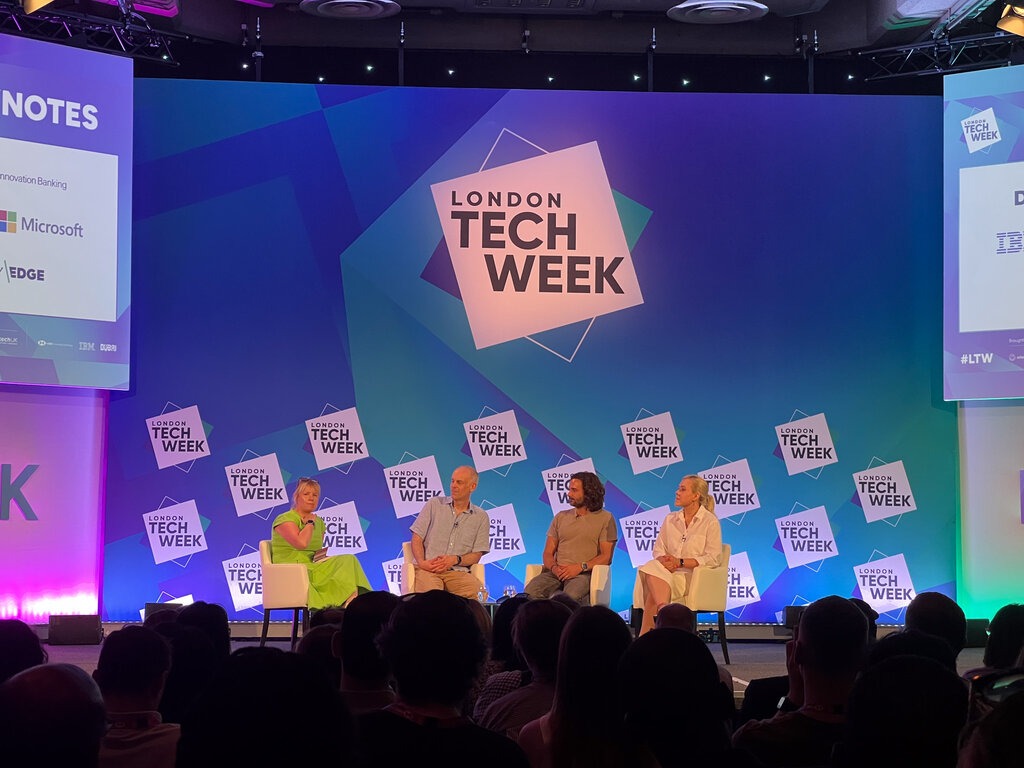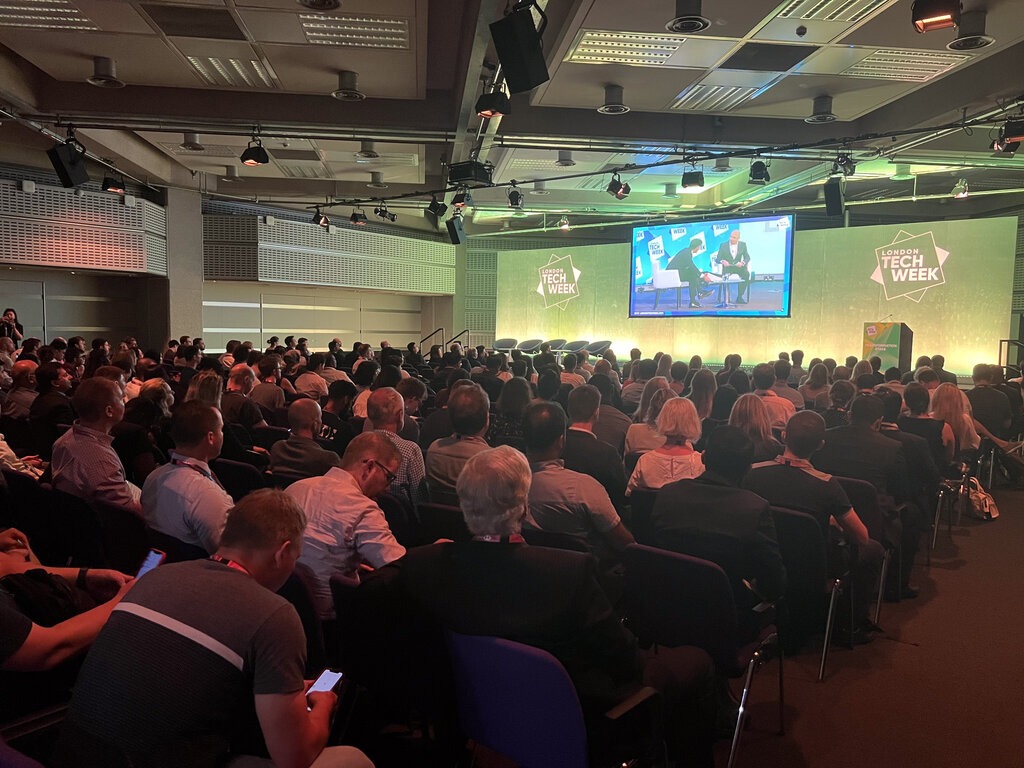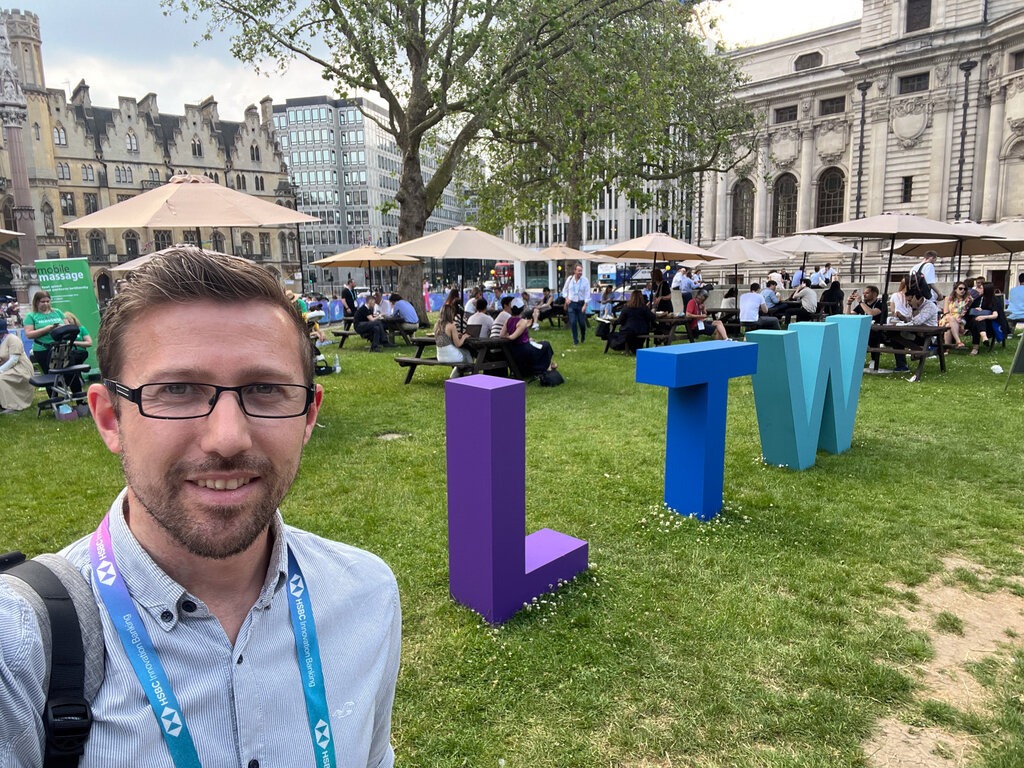London Tech Week 2023 brings together inspirational founders, top business leaders, policymakers, investors and rising stars to engage in discussions on technologies that will unlock new opportunities and transform the future.
This year’s theme was “Shape the Future: Uniting global tech to drive sustainable innovation”. Jake was privileged to be there as a delegate, and he shared his views on 3 key areas:
1. The UK tech ecosystem is strong, 3rd only in size to the US and China
You could be forgiven for not trusting everything a politician has to say, but in his opening address, Rishi Sunak made a compelling case that the UK was the place to be for tech innovation and development. The Prime Minister was particularly proud of announcing fast growth in specific sectors such as Creative Industries (including Gaming, AR/VR, Film/TV and Marketing), as well as Quantum Computing and Life Sciences. Sunak recognised that there was a challenge with accessing capital for scale-ups, with the Chancellor confirming that there were plans afoot to unlock pension assets, going someway to resolving this problem.
Ultimately, my views are that we need to be an attractive destination for people to want to develop fantastic businesses, offer them the access to capital required and remove any unnecessary bureaucracy that gets in the way. ‘High value’ visa applications are a step in the right direction, but education also needs to adapt so that UK entrepreneurs of the future can access and develop the right skills in an ever-evolving world.
Innovative tax incentives for businesses starting up and growing in the UK is welcomed, although of course the balance needs to be struck between the cost of incentivising enterprise and the benefit of these businesses creating jobs and wealth.
2. We are seeing huge steps in AI capability, and it’s changing how we work and live
Whilst the stages had different names – the start-up stage, the growth stage, the health and wellbeing stage – they all had one thing in common. Artificial Intelligence.
Both the Prime Minister and the Chancellor were keen to point out that they see AI being a ‘co-pilot’ to aid current overworked and under-resourced employees, rather than replacing jobs. This was backed up by senior figures from Microsoft, IBM and the NHS, who compared the current ‘digital revolution’ to the time when machines started making standardised products, making those items cheaper to produce and therefore increasing accessibility to all.
I think it is clear that some jobs will be displaced by the sheer computing power of AI, and this is and will continue to change at a fast pace. One example was given where investment in AI meant that 650 jobs in the HR department were effectively ‘redundant’, but those people could work on higher value tasks that needed human input.
Business owners and employees will need to ensure they assess the risks of automation, and proactively develop the learning and development of teams to be competitive. Standing still has never been an option – some businesses will thrive with the change and there will be those who struggle.
3. Global problems are going to be solved by tech, or are they?
There were two main Global Sustainable Development Goals addressed during the sessions – Climate Action (London Net Zero by 2030 anyone?), and Good Health and Wellbeing. Of course, the view was that tech was going to solve these issues, being London Tech Week and all.
Using big data and technology to aid faster and more accurate drug discovery is one that we are all too familiar with through the last 3 years, but there were also examples of how early diagnosis of different illness could be obtained by coughing into an app, or an algorithm giving a % chance that a mole could be cancerous. These are impressive advancements in technology that support the diagnosis and treatment of life-shortening illnesses.
Sadiq Khan took the stage to introduce a new London Climate Resilience Review, looking at ways to achieve Net Zero in London by 2030. The challenge was very clearly laid at the feet of innovative entrepreneurs – we need innovative solutions to optimise our energy usage, generate that energy in a ‘clean’ way, at a price point that is palatable.
But. There were three key points that need to be addressed.
• Equality – Owase Jeelani, a neurosurgeon at Great Ormand Street Hospital, was very clear that the outcomes for the same procedures were very different depending on where you are in the world. How can we ensure technological advances ensure that a child gets the same opportunity to survive regardless of their location?
• Digital waste – Matt Watts, NetApps, explained we would have created a Yottabyte of data by 2030. It’s a lot – the equivalent of every human on the planet carrying 500 iPhones! With increased data, there is increased energy usage to store this data, so tech is accelerating problems around climate action, not the other way round… Two thirds of data created is never used again, and with the storage of this data creating more emissions than the whole airline industry every year, is there not an opportunity to change our mindset around data retention and creation?
• Security – with any innovative advances to do good, comes bad actors who, in some cases, wish to disrupt whole countries. The cost of cybercrime is projected to hit an annual $10.5trn by 2025, and it becomes a question of when, not if, your organisation will be impacted by cyberattack. Will the security and protocols of our global data be designed to minimise this risk?
Are we up to the challenge? From speaking to delegates from around the world at the event, they most certainly believe we are!
Author: Jake Standing, Director
Any views or opinions represented in this blog are personal, belong solely to the blog owner and do not represent those of Plus Accounting. All content provided in this blog is for informational purposes only. The owner of this blog makes no representations as to the accuracy or completeness of any information on this site or found by following any link on this site.
Date published: 20 June 2023





